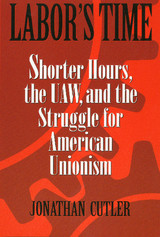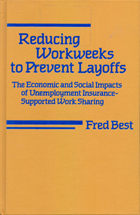

International competition and variable economic conditions have brought the threat of layoffs to the doorsteps of workers and managers in all sectors of our economy. One response to this problem is Unemployment Insurance-Supported Work Sharing. This new and promising program reduces the human and economic costs of layoffs by providing partial unemployment benefits to employees who have their workweeks reduced as an alternative to layoffs. Fred Best provides a balanced and thorough assessment of this policy in the United States, Canada, and Europe.
Unemployment Insurance-Supported Work Sharing maintains the income and fringe benefits of all workers at near full-time levels, enabling firms to maintain the skills and working relations of their employees and preventing undue hardships among those who would otherwise lose their jobs.
Best summarizes the history and effectiveness of these programs in terms of their economic and human impacts on employers, employees, government, and the economy. He presents key insights on how worktime and worker management cooperation can become powerful tools for combating joblessness and increasing economic performance. This definitive account of an important experiment in work hours will be of critical importance to managers, workers, policymakers, economists, and those concerned with employment issues.
In the series Labor and Social Change, edited by Paula Rayman and Carmen Sirianni.
READERS
Browse our collection.
PUBLISHERS
See BiblioVault's publisher services.
STUDENT SERVICES
Files for college accessibility offices.
UChicago Accessibility Resources
home | accessibility | search | about | contact us
BiblioVault ® 2001 - 2024
The University of Chicago Press









